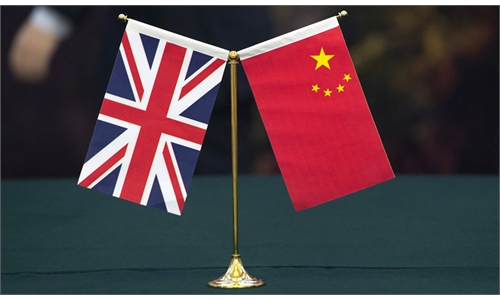
Illustration: Liu Rui/GT
The UK's Information Commissioner's Office (ICO) said on Tuesday that it had fined Chinese-owned video app TikTok 12.7 million pounds ($15.9 million) for breaching data protection laws. In response, a TikTok spokesperson said the company disagreed with the ICO's decision but was pleased the fine had been reduced from the amount set out by the ICO last year, Reuters reported.While it is hard for outsiders with limited information to tell whether the fine is justified or not, the timing of the ICO announcement may speak more volume compared with the actual figure of fine. It makes markets worry about more regulatory setbacks for the app in the UK. The ICO's fine came at a time when Western governments and institutions have in recent weeks followed the US to issue bans over the usage of TikTok on official devices citing unsubstantiated security concerns.
As a loyal US ally in Europe, the UK is used to moving in lockstep with the US when it comes to policy against China or Chinese companies, so as to show its support for Washington's intentions. As the UK's economic problems have mounted in recent years, so has the frequency with which the UK government has aligned its policy stance with the US. For instance, in mid-March, just hours after news came that the Biden administration demanded TikTok be sold or could face a ban in the US, the UK government announced a ban of the app on government electronic devices.
The UK is trapped in a vicious cycle. In order to seek closer ties with the US, it has chosen to follow Washington's Cold War mentality on many fronts, including its own economic policies, regardless of the fact that over-politicizing economic issues has become a major drain on its own growth momentum and development potential. With its economic woes worsening, the UK is more inclined to be sided with the US by doing more damaging decisions to its economy.
One of the consequences is the disruption of the UK's China policy, which has seen increasing regulatory hurdles for Chinese companies operating there. The UK government has interfered in normal business cooperation between Chinese and UK companies several times in recent years, clearly violating international commercial rules and hurting its own business interests and credibility.
In 2020, the UK decided to ban Huawei from its 5G networks following pressure from the US, requiring local telecoms operators to remove all Huawei equipment already installed in their networks by the end of 2027. The decision significantly increased the cost and slowed the pace of 5G construction in the UK.
In 2022, the UK government ordered Chinese-owned Dutch chipmaker Nexperia to sell its majority stake in Newport Wafer Fab, the UK's largest chipmaking facility, reversing a takeover deal of a struggling UK business over concerns it may undermine national security. At the end of last year, the UK government has also forced China General Nuclear out of construction of the Sizewell C power station.
If anything, all the events have left the impression that the UK government's economic policy is gradually slipping into an ideological abyss. And there is every reason to worry that the investment climate in the UK is getting worse for Chinese companies. Particularly, Chinese companies that are being targeted by the US could be treated unfairly in the UK.
While Chinese firms may be at risk, this would also hurt the UK's own economic potential and ability to attract international investment. Without the basic business credibility and continuity of its economic policy, how could the UK build itself into an attractive partner for international economic and trade cooperation to achieve its "Global Britain" vision? If the UK has not given up on such ambitions, now is the time to show that it still has the will to offer a transparent and fair environment for businesses, whether they are from China or other parts of the world. TikTok will be the best test to it.



